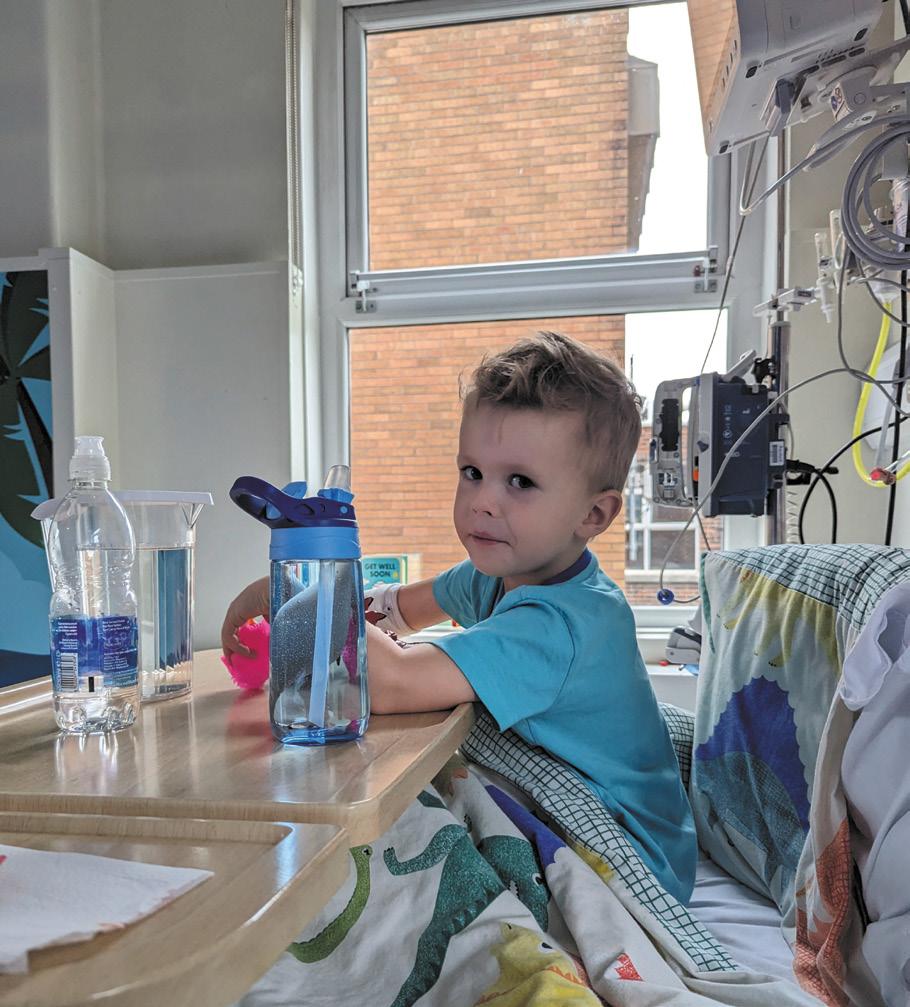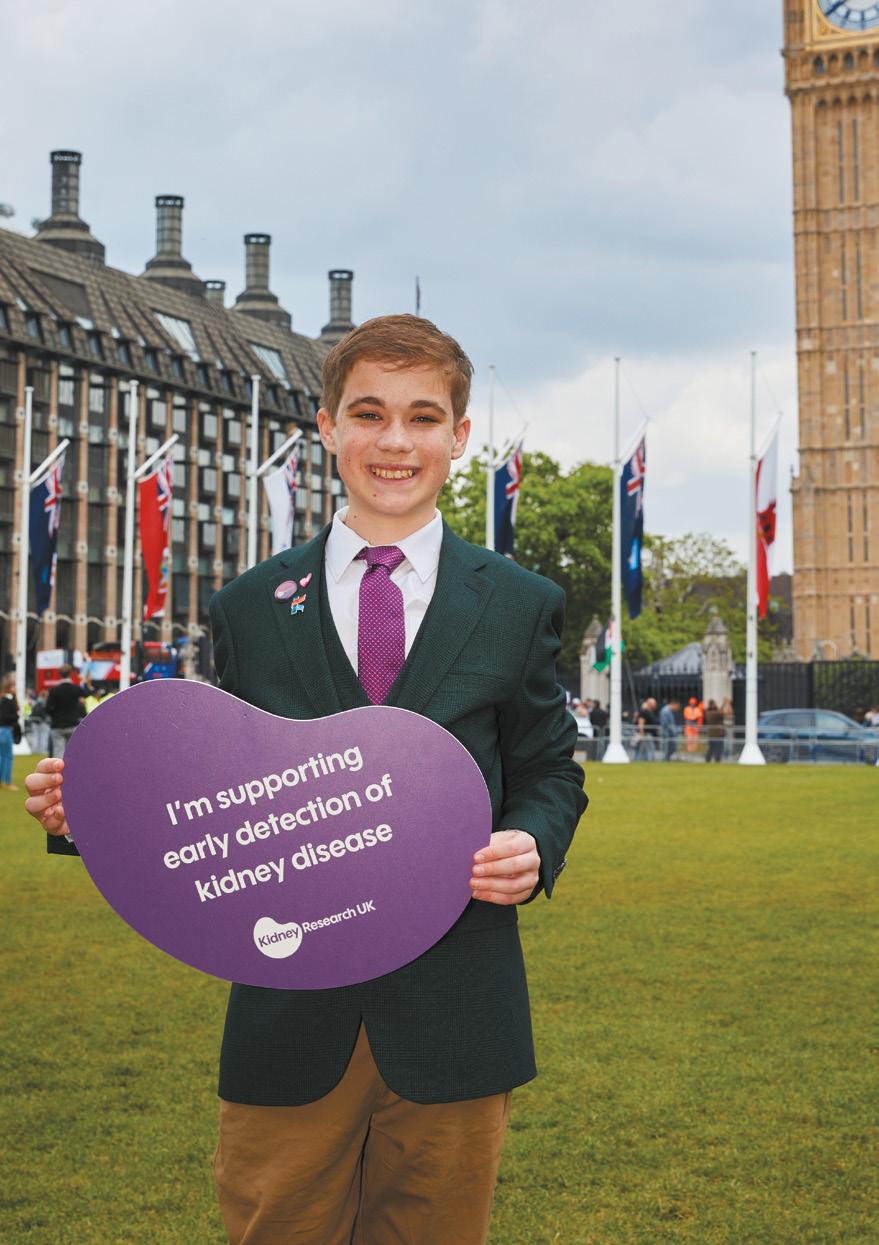

What’s inside.
P4-6
Charlie urges parliamentarians to take urgent action
Our front cover star, Charlie Frieland reflects on speaking at a Westminster reception to raise awareness of young people’s experiences.
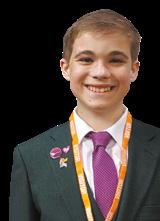
P7-9
New report reveals devastating impact of rare kidney diseases
Children bear greatest rare kidney disease burden.
P10-13
SGLT2 inhibitors: a new era in protecting kidney health?
Does this medication offer new hope for kidney patients? Consultant nephrologist Dr Dominic Taylor explains its potential and how our funding is helping.
P14-15
Flying to the rescue
Former easyJet CEO Johan Lundgren and his brother share their transplant story.
P16-18
Your kidneys, your health – Closing the knowledge gap
Do you share our supporters’ frustrations over other people’s ignorance about kidney disease?
P19-20
How to be a top fundraiser Inspiration and ideas from 11-year-old Harley-Ray.
P21
Andy Cole Fund hits £0.5m
Your support for the Fund is helping kidney patients today and in the future.
P22-23
Gift inspiration Christmas is approaching –what’s on your wish list?
P24-26
Thank you! Featuring a selection of our wonderful supporters and the amazing things they do for kidney patients.
P27
Diary dates
The latest don’t-miss events with Kidney Research UK.
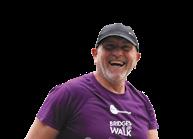
Contact the editorial team Kidney Research UK, Stuart House, City Road, Peterborough PE1 1QF 0300 303 1100 pressoffice@kidneyresearchuk.org Website: www.kidneyresearchuk.org
Designed by www.adeptdesign.co.uk Registered charity no. 252892. Scottish charity no. SC039245.
Welcome.
Our cover story in this issue highlights a remarkable moment. The day that young kidney patient Charlie Frieland spoke at Parliament. His message to MPs was clear, urgent and moving: more needs to be done to support children with kidney disease. The impact of kidney disease on young people is also the focus of our new Christmas fundraising appeal, which is coming your way soon.
Get ready to meet the courageous Bella
Our appeal features the amazing Bella. At just six years old, Bella faces the many restrictions and challenges of her daily dialysis treatment with courage, and an infectious smile. She really is an inspiration. I can’t wait for you to meet her.
Bella is waiting for a donor kidney, but so far, a match hasn’t been found. That’s why I’m so excited about a new piece of research by Dr Sarah Hosgood, which we’ll also feature in our Christmas appeal.

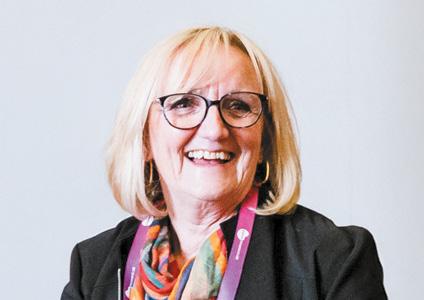
A leap in transplant science
Dr Hosgood is developing a new process to rejuvenate donor kidneys from older people. It could increase the number of kidneys available to people like Bella, while making the organs healthier and longer lasting. It could be a game-changer, saving people months, or even years, of being stuck on dialysis.
Support our Christmas fundraising appeal today
Our Christmas appeal will be popping through your letterbox soon, but you can support it today at: www.kidneyresearchuk.org/bella
As always, thank you for being part of our kidney family.

Sandra Currie OBE, chief executive
kidney disease ends here.
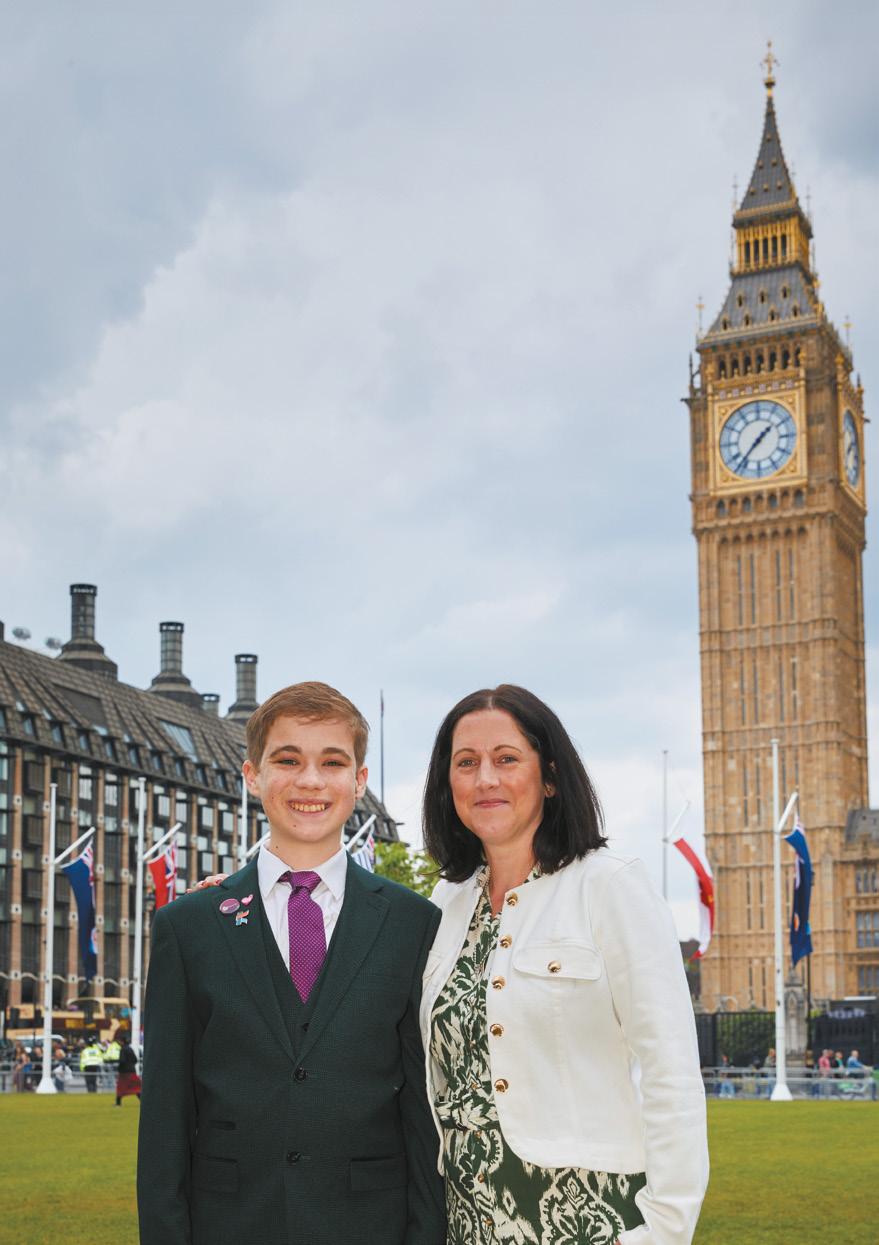
Charlie urges parliamentarians to take urgent action
.
Only weeks since his kidney transplant, 15-year-old Charlie Frieland took to the podium at a Westminster reception in front of a room full of MPs and peers. With a total of 7,500 hours of dialysis sessions under his belt, Charlie tells us how he shared a moving account of his experiences in support of our call for urgent action on kidney disease.
Iwas nervous before my speech because I hate being the centre of attention, but many people don’t realise kidney disease impacts all ages, so it’s really important young people are heard. When I took to the podium all I could hear was my heart beating in my ears, I tried to get eye contact with a lot of different people, so they all felt I was talking to them personally.
Prior to my kidney transplant I knew the event was coming up and already had some clear ideas about the key messages I wanted to deliver. Having my transplant enabled me to bring my speech full circle, and I suppose it allowed me to give a perspective about living life after a transplant that I would previously not have thought about.
I wasn’t feeling well leading up to the event and my parents kept saying I didn’t have to go, but I wanted to because taking kidney disease to parliament is something I have wanted to do for a long time. I didn’t want an adult speaking on behalf of children.
In my speech I spoke about the inequalities in paediatric care, and how the lack of data surrounding the number of children living with kidney disease needs addressing because with the correct data, the government, medical professionals, researchers and charities can
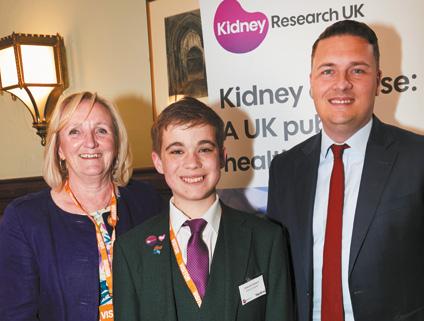
I don’t know how long this will last because a transplant isn’t a cure, I’ll need medication for the rest of my life, I’ll always live with kidney disease, and I know that one day I’ll have to face a life on dialysis again.”
Charlie Frieland
come together to better identify causes and manage early interventions and treatments. I have nephronophthisis, a rare genetic condition, and I explained that 60% of children on dialysis or living with a kidney transplant have a rare disease, yet our access to medical advancements and medications is 13 years behind that of adults.
I asked for the MPs attending the reception to pledge their support to patients and highlighted how the government need to prioritise kidney disease to prevent the looming crisis
that Kidney Research UK has warned about, with the number of patients rapidly increasing.
Afterwards, I received a lot of positive comments, which was nice but a bit overwhelming. I was able to give Wes Streeting a letter summarising my specific asks of the government, and I had a brief conversation with him too.
I have since received a reply in which he personally challenges me to keep in touch and keep him on his toes.
I’ve already written back asking for his support with the charity call for a national strategy on kidney disease.
I know that I can’t speak on behalf of all children with kidney disease, but I hope that I at least represented them well and delivered the important message that change needs to happen, fast. I hope it gives other young people living with kidney disease the confidence to have a voice too, because I think we all have the power to make a difference.
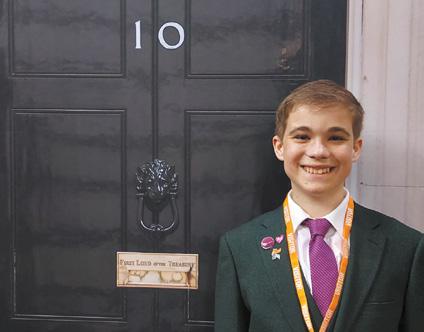
I had my photo taken with a cardboard cutout of the front door at 10 Downing Street – someone quipped that’s the closest I’ll get, I replied no it’s not! There is so much more to be done, and I think now is the time to act, before it really is too late. We need to get kidney disease through the front door of No 10.
An extract from Charlie’s speech
If I think back, I can’t really remember life before kidney disease and dialysis, those are my childhood memories. Feeling poorly, being in hospital and having lifesaving treatments has been my version of normal.
I’m lucky; I’ve been handed back my childhood, I can live my life away from dialysis and can start to explore what my new normal looks like. I don’t know how long this will last because a transplant isn’t a cure, I’ll need medication for the rest of my life, I’ll always live with kidney disease, and I know that one day I’ll have to face a life on dialysis again.
I know many other children will not get this opportunity and will lose their fight against kidney disease and that is why your help is so important to me, and all the children living with kidney disease.
Children bear greatest rare kidney disease burden.
Our new report reveals the devastating impact of rare kidney diseases which affect 160,000 people in the UK –and sets out the change that’s urgently needed.
For most children, missing school might mean a bout of flu or a broken bone. For those with rare kidney diseases, it can mean losing as much as a year of education, falling behind friends, and facing a future shaped by relentless treatments and missed opportunities. That impact doesn’t end when childhood does –many adults with rare kidney diseases struggle to stay in work, with research showing 64 percent are out of
employment by the time they reach kidney failure.
Our new report, published in September, Collectivelycommon: thedevastatingimpactofrare kidneydiseasesintheUK, brings together evidence, clinical voices, and personal stories to shine a light on what it really means to have and grow up with a rare kidney condition. The findings show just how urgently change is needed.
kidney disease ends here.
Rare kidney diseases, though individually uncommon, collectively have a devastating impact. They account for around ten percent of all kidney conditions in adults but drive a quarter of all dialysis treatments and transplant operations.
Children are disproportionately affected, with more than six in ten of those reaching kidney failure living with a rare disease. The disruption is relentless, with most missing more than a hundred days of school – over half the UK school year. Families are left juggling jobs, hospital visits and the emotional toll of kidney failure. Concerningly, while research is moving at pace for adults, children often wait more than a decade longer. Too many clinical trials exclude paediatric patients altogether, leaving children dependent on decadesold treatments.
Sandra Currie, chief executive of Kidney Research UK says: “This first insight into the wide impact of rare kidney diseases lays out a clear path to improve research and care pathways for all and the
urgent need to especially create change for young people. We need faster and more accurate diagnosis, using tools like genetic testing, and smoother transitions between children’s and adult services. We need to make sure children are included in clinical trials, so they aren’t last in line for innovation, and we need to identify patients earlier and connect families with research.
Children are growing up with treatments that have changed little in decades, and are set to reach adulthood still waiting for the right kind of innovation. With better investment, more research and bold, sustained policy change, we can give them a better future.”
in action Research
Our new LifeArc-Kidney Research UK Centre for Rare Kidney Diseases is addressing many of the challenges the report identifies, including running UK-based clinical trials to help bring new treatments to patients, faster.
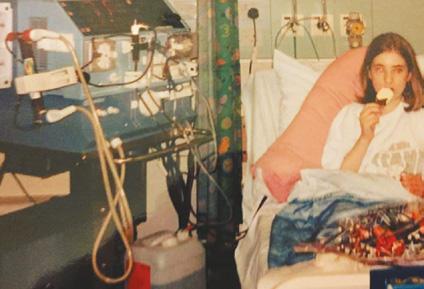
Kathryn’s story
“I lost a year of school”
New mum Kathryn Croker recalls developing stomach pain, joint swelling and a rash at the age of 13. Tests revealed IgA vasculitis, a rare disease that attacks small blood vessels including the kidneys. Within five months her kidneys failed and she needed dialysis and plasma exchange, forcing her to spend a year away from school. “I completely lost touch with my friends,” she remembers. “The high-dose steroids changed my appearance, and I felt isolated.”
Although her kidney function later improved, her health remained fragile. By her twenties she needed a kidney transplant.
I’ve managed to rebuild my life, but children diagnosed today are still going through what I did more than 20 years ago. That shouldn’t be the case.” Kathryn, now 39
Morven’s story
“I have to take medicine every six hours”
Fifteen-year-old Morven lives with cystinosis, a rare inherited disease. Diagnosed as a baby, they must take medication every six hours, including in the middle of the night, to slow the disease’s progression. “It means I can never sleep through,” Morven says. “At school, I have to go to the first-aid room at breaktime. Sometimes I feel left out.”
The medicine helps keep their kidneys working but brings its own challenges. Their mum, Alex, says: “The care burden is constant. We’ve been lucky Morven hasn’t needed dialysis yet, but life is dominated by medication and hospital visits and uncertainty. It’s important for researchers, clinicians and families affected by cystinosis to work closely together to find breakthroughs which can transform lives.”
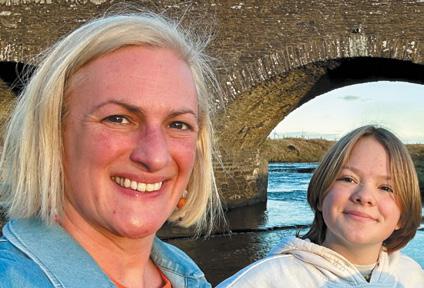
kidney disease ends here.
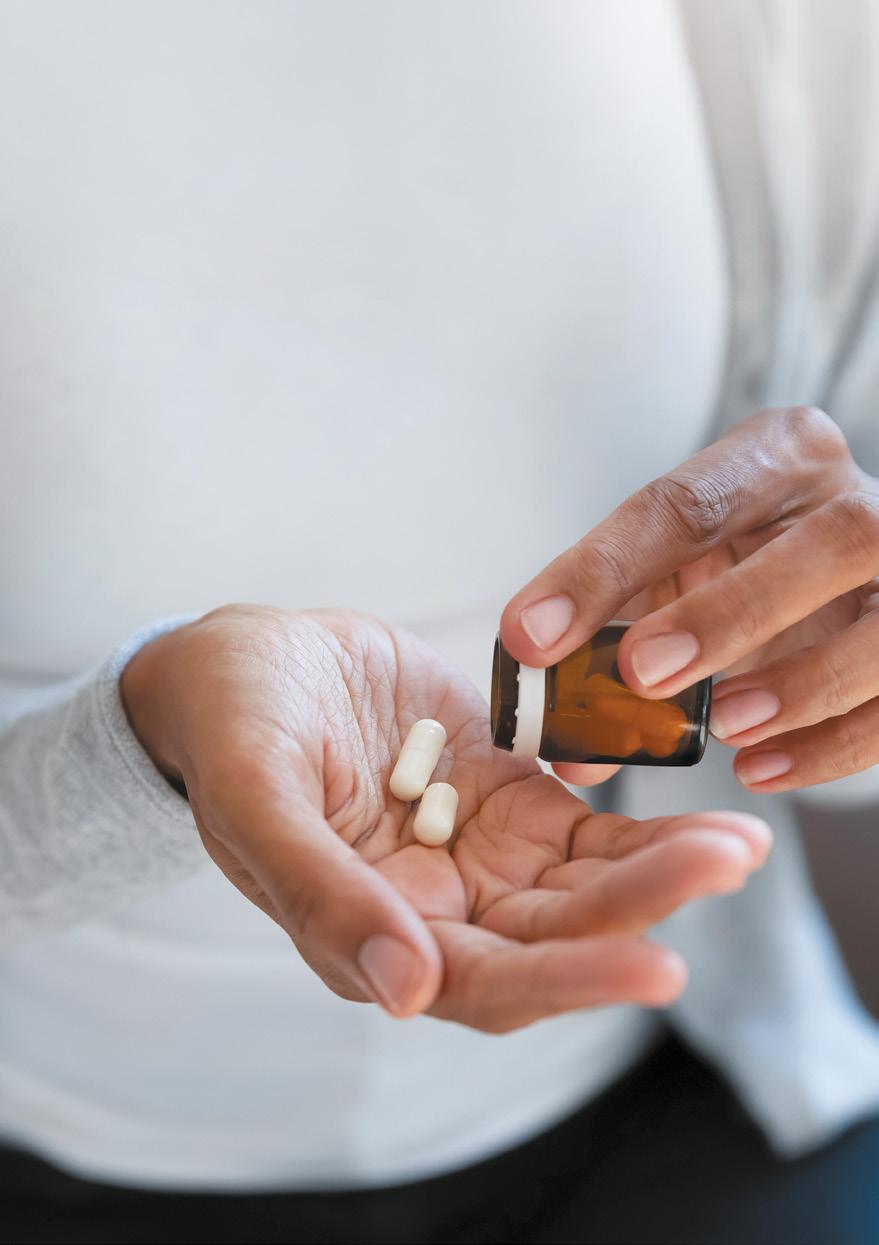
A type of medication called SGLT2 inhibitors could help people with chronic kidney disease (CKD) stay well for longer. We spoke to our funded researcher, consultant nephrologist Dr Dominic Taylor from the University of Bristol to hear more about SGLT2 inhibitors and his study into getting access to this treatment.

To start off, could you explain what SGLT2 inhibitors are?
SGLT2 inhibitors, often called “SGLT2i’s”, are given as tablets; usually once a day. They have a brand name and a chemical (generic) name which ends ‘– liflozin’. These drugs alter the way the kidneys handle salt and sugar, and can help the body get rid of more sugar in the urine. Because of this, SGLT2i’s can treat people with diabetes, and recent research has shown they can benefit heart failure and CKD patients too. We know SGLT2i’s can reduce the amount of protein lost in the urine in CKD, how quickly kidney function is lost, and reduce the risk of death from heart failure.
How do SGLT2i’s protect kidney function and what hope do they offer?
Although we do not have a cure, the future looks brighter with
multiple treatment options for kidney disease. For many patients, SGLT2i’s can offer more protection in addition to medications such as angiotensin converting enzyme (ACE) inhibitors and angiotensin receptor blockers (ARBs) which have been the standard approach to care in kidney disease patients. ACE inhibitors and ARBs reduce the strain on the delicate kidney filters by decreasing blood pressure and reduce how much protein is lost in the urine.
SGLT2i’s also protect the kidney, but in a different way. By increasing the amount of sugar and salt in the urine they can reduce pressure in the kidney filters and improve their function. Because these treatments work in different ways we can combine them for a greater overall effect. A key challenge for healthcare providers is getting the use of these treatments right, so all patients receive the full benefit.
How did researchers first find out about the protective effect on kidney function?
SGLT2i’s were first studied in big clinical trials involving people living with diabetes, some of whom also had kidney disease; positive impacts were seen in both groups. This led to trials in CKD patients with and without diabetes, which confirmed SGLT2i’s could offer important benefits, reducing the risk of disease progression and death from kidney or cardiovascular causes (heart health being a serious problem as kidney function decreases).
Can children benefit from these medications?
There currently isn’t evidence for using these drugs in children with kidney disease, but the LifeArcKidney Research UK centre for rare diseases will be launching a clinical trial in children. We need to make sure that everyone can benefit from progress in science in a safe way.
Tell us about your research into access to these medications
We know people living in areas with more deprivation are more likely to develop kidney disease. Early studies have also shown that people living in deprived
areas of the UK are less likely to receive SGLT2i treatment when it is needed. Swift diagnosis is key to equal access to new treatments, and this is dependent on early GP or hospital appointments, but often those most in need are the least likely to get prompt medical care.
in action Research
Using Kidney Research UK’s grant our team are looking at this in more detail, to identify what barriers might exist and how we can overcome them.”
What needs to change so that all eligible patients have access to these vital medicines?
This is complicated, but care outside of hospitals is crucial. We need to make sure GPs have the resources to identify who would benefit from them. Currently kidney disease is not prioritised in the same way as conditions like diabetes or heart disease, which limits the time and information available to support patients. We need a shift towards early diagnosis, with greater training on available treatments.
I hope my work with Kidney Research UK will help inform changes that are needed.
What advice would you give someone who thinks they might benefit from SGLT2i’s?
Talk to your doctor. SGLT2i treatment isn’t suitable for everyone, but this should be explained and an alternative plan made in partnership with you, if this is the case for you. You can show them this article too.
Treating patients early with SGLT2i’s protects their kidney function, so I would encourage conversations early – as soon as any kidney damage is suspected.
Lastly, we know that the NHS is facing a crisis as the number of patients requiring dialysis is predicted to reach 143,000 by 2033, what role can new treatments play in addressing this?
SGLT2i’s are proven to slow the speed of loss of kidney function in people with chronic kidney disease. So, as well as having benefit to individual patients on their risk of heart disease and further loss of kidney function, we would expect that their widespread use would help avoid a lot of people reaching kidney failure and needing dialysis.
Medication guidelines

The SGLT2i’s empagliflozin and dapagliflozin are recommended by the UK’s regulatory bodies. Both empagliflozin (eg Jardiance) and dapagliflozin (eg Forxiga) are only offered as additional medications for patients already on the maximum tolerated dose of ACE inhibitors or ARBs, unless these are unsuitable for the patient.
Patients suitable for empagliflozin or dapagliflozin will have:
• an eGFR (measure of kidney function) between 20 and 44 ml/min/1.73 m2 or
• an eGFR of 45 to 90 ml/min/ 1.73 m2 with either:
• a urine albumin-tocreatinine ratio of 22.6 mg/ mmol or more or
• Type 2 diabetes
Flying to the rescue.
Former easyJet CEO, Johan Lundgren and his brother Per are huge advocates for living kidney donation. In an exclusive interview, they told us about their transplant journey.
When his elder brother, Per, suffered kidney failure in 2008, donating a kidney was a simple choice for travel industry chief, Johan Lundgren. They had always been close, and Johan was fit and well.
Johan, 58, says: “Although I gave Per a kidney, I gained a lot more by being a donor. 16 years later, my brother is thriving, I’m in good health and it’s rewarding to have done something so significant.
“Sure, I felt bad for a few days, but one week later I felt myself again. The worst pain was from laughing too much, post-transplant, when we watched Monty Python together!”
Receiving a transplant was transformative for Per, whose kidneys had been slowly deteriorating without his knowledge, before prescribed painkillers to treat a severe, chronic facial pain, caused them to fail completely.
Per, a 62-year-old managing director, says: “I realise now I’d had symptoms of declining kidney health for some time. I’d lost energy but put it down to my age.
Fortunately, my wife forced me to go to hospital. I was told if she hadn’t, I would have died within days.
My diagnosis scared me, and I had to begin dialysis. However, stories of people who had received transplants gave me confidence that I would get well again, so I remained optimistic.”
The two brothers, from Sweden, have retained a strong bond throughout their lives.

Johan says: “Although we lost our father at a young age, we grew up in a fantastic community and share the same humour, values and interests. Music has been a huge part of our lives. I played the trombone and Per toured across Sweden with his own band in the 1980s. More recently, we’ve both been in leadership roles.
I know Per is there for me and I’m here for him. When his kidneys failed, I was probably more worried than he was. There was no need for discussion, of course I was going to donate a kidney. I just had to wait and see if I would pass the medical tests.”
The transplant took place at Sahlgrenska University Hospital in Gothenburg, Sweden, in 2009.
Per says: “It’s impossible to describe the feelings I have towards Johan for donating a kidney. How do you describe a gift like that? It’s the reason I have been able to live my life to the fullest over the past 16 years, and I hope for many years to come. I only wish that more people are given the same gift. For that, we need more brave, generous, fellow human beings to become donors.”
Johan says: “So many people are waiting for a kidney transplant. What an opportunity it is to be a donor.
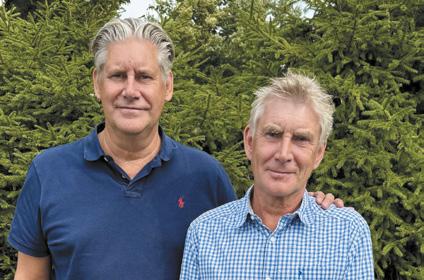
I cannot recommend it enough. Per and I are proof of how you can thrive with one kidney and what difference you can make to somebody else’s life.”
in action Research
Creating great transplant journeys for more people.
We’re working on solutions to help more people have successful transplants, by funding research into whether cell therapy can improve the usability of kidneys from older deceased donors. If successful, this could reduce the transplant waiting time for patients without a live donor.
For more information about living donation, visit www.donateakidney.co.uk to find about the support on offer through the Robert Dangoor Partnership for Living Donation, which we run with the charity Give A Kidney.
Your kidneys, your health Closing the knowledge gap.
Kidney disease – so prevalent, yet so misunderstood. Four patients tell us how they tackle people’s lack of awareness about kidney disease. There was a huge reaction on social media when we asked what bizarre things people have heard said about kidney disease.
Mum Sarah Bingham was one of the hundreds who responded to our post. She is mum to three children – Noah (25), Ariel (20) and Casper (16) –who have nephronophthisis, a rare kidney disease.
In 2022, Sarah donated her kidney to Ariel and Noah received a kidney from a friend about 12 weeks later. Within 16 months, Noah’s new kidney sadly failed and he is back on dialysis. Ariel’s recovery has not been straightforward and Casper is about to start dialysis.
Jaw-dropping comments
The Bingham’s family life is a constant round of dialysis sessions and hospital appointments, but not everyone sees just how necessary these are.
Sarah says: “One person said to me, a few years back, ‘Oh well I wouldn’t put up with all of that,
having to go to hospital. I would pack them up in a van and go and travel the world and get away from it all.’ That’s just not possible.”
Dialysis sounds really restful.
They have even found issues within the medical profession. On one occasion, the family were met with a nurse who refused to bump Noah up the queue for an urgent ECG so he could fit it in before his dialysis session. “I couldn’t believe it when she said ‘Can’t you just miss dialysis?’” Sarah recalls.
Since Noah and Ariel’s operations, Sarah has also found people don’t understand the limitations of transplants:
“We’ve had a lot of comments implying they must be all better and have a completely normal life now. These people totally miss the point: they have to take immunosuppression for the rest of their life. As we saw with Noah’s, the kidney could fail at any point. Yes, you’ve got freedom from dialysis, but nothing’s guaranteed.
I’m constantly sharing Facebook posts about what the kids have dealt with and saying ‘It’s not a cure!!’
Educate, educate, educate
Like Sarah, Christy Millar is wellseasoned in dealing with other people’s lack of awareness. With a failed transplant and with ten years on dialysis and counting, these days she takes no prisoners.
“At first I’d just smile and change the subject, but now I’m older I don’t put up with it,” she explains. “I don’t look ill? Why, thank you – you should see my insides. It takes a lot of effort to look this ‘well’. Dialysis, wow you get to sit down for 12 hours a week? Yep, with enormous needles in me and all my blood in a machine. What fun!
What do you mean, you have to take tablets for the rest of your life?
Is that infectious?
You’ve had a transplant, you’re cured!
“I tend to answer everything with sarcasm – which is terrible. But I like to teach people things if they’re willing to listen.”
Darren Daniel (aka @ttkwarrior) also relishes the opportunity to educate people. Since his diagnosis he has made it his mission to use his TikTok account to share tips on kidney health, and has over 112,000 followers and rising.
Darren says: I’ve had all manner of questions or comments made from people who have no idea about kidney disease. One comment is: ‘You’ll have to stop boozing now’. But I was never a drinker, alcohol hasn’t caused me any issues at all.”
Meanwhile, every year Hiren Samgi embraces the chance to shine a light on kidney disease, having had a transplant in 2021. Each December, he sells Christmas trees and donates 25% of the sales to the Kidney Research UK.
“I use it as a way of people knowing more about me,” he says. “Customers ask, do you have someone in the family with kidney problems and I say ‘Actually, it’s me.’ It’s a way of telling people about my situation.
They ask why I support Kidney Research UK over any other charity and I say they really helped me a lot and the research is there for people like me.”
Surely skipping dialysis won’t do you any harm.
Want to do your bit to improve awareness in your local community?
Find out more about volunteering on our website: www.kidneyresearchuk.org/volunteer or you can email our friendly team volunteer@kidneyresearchuk.org or call 0300 30301100.
How to be a top fundraiser.
At just nine years old, Harley-Ray has raised almost £2,000 to fund research into kidney disease, with her mum, Chloe-Jade.
They’ve been determined to make a difference ever since Harley-Ray was diagnosed with chronic kidney disease in 2020, taking on a series of challenges. Now, they’re sharing what they’ve learnt over the past five years, helping others to get started with their own fundraising.
Chloe-Jade says: “Harley-Ray had to grow up fast because of her condition, but she’s never let it dull her smile. It has been distressing but we’re trying to preserve her kidney function as best we can, delaying the need for dialysis or a transplant.
“She’s a real kidney warrior and shares her experiences on ‘Harley-Ray’s kidney page’ on Facebook to raise awareness. She is so knowledgeable about kidneys and teaches friends about their importance. We are incredibly lucky she’s our daughter.
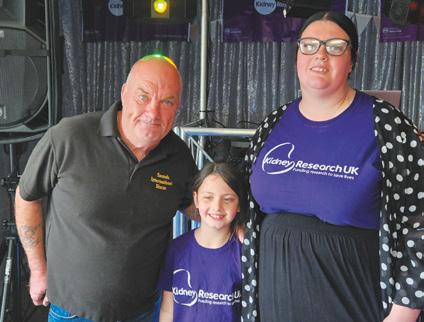
and
“Fundraising can be daunting when you’re not sure where to begin, but we’ve found it so rewarding and want to share our experiences to help others get involved.”
Harley-Ray’s fundraising
Our challenge events were HarleyRay’s first step into fundraising, inspiring her to run Halloweenthemed parties and raise sponsorship. From there, HarleyRay has raised money through cake sales, inviting friends to make donations to her Facebook birthday fundraisers and by hosting her own Easter party event in April 2025.
kidney disease ends here.
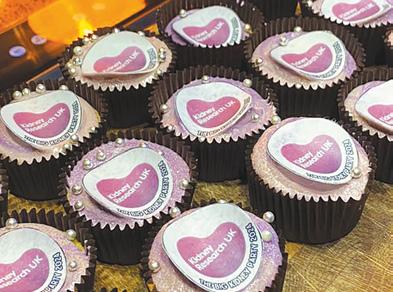
Harley-Ray says: “The Easter party was my favourite. I invited everyone in my hometown to come along for a disco, raffle, stalls, prizes, games, food, drinks, and to meet Stitch from Disney! We made colourful butterfly cakes that were so yummy. My friends ran a bracelet making station and are the best friends ever. They helped me out lots.
I really enjoyed planning the day with Mum. It was brilliant to see everyone’s happy smiles and to help fund research that could save lives, including mine. If you’re thinking of doing fundraising, don’t be scared and just go for it!”

Top tips
Chloe-Jade’s suggestions:
1. Start planning early
Giving ourselves time to prepare meant we could involve others and advertise our event. We reached out to local businesses and were pleasantly surprised by the amount of support we received.
2. Don’t be afraid to ask for help Kidney Research UK can support with your fundraising ideas. They made everything less stressful for us. They provided advice and resources like leaflets, decorations and games.
3. Advertise your fundraising
It was important to get the word out to invite people to our event and promote our JustGiving page. We told people we knew, created a poster and shared our story on social media.
4. Be proud
Recognise your successes. I’m so proud of Harley-Ray and her achievements and we can’t wait to run another event next year. We want to thank everyone who has supported us and Kidney Research UK.
Did you know, thanks to funds raised by fabulous supporters like Harley-Ray, in the last financial year, we were able to invest £11.2m in research to improve the patients’ lives.
Find out how to start your fundraising at www.kidneyresearchuk.org/support
Andy Cole Fund reaches incredible £500,000.
The Andy Cole Fund reached a remarkable milestone this summer –with over £500,000 now raised for research into making transplantation equitable and supporting patients’ mental health and wellbeing.
After a series of spectacular events to drive the fundraising forward, generous guests at the third annual Andy Cole Fund Golf Day in June got the tee-riffic total over the half a million mark. Teams competed at The Shire London, taking on exciting challenges, including ‘Beat the Pro’ with professional golfer, Neil Wain.
The day concluded with a BBQ hosted by Sky Sports News presenter Dharmesh Sheth. We’d like to thank WeBuyAnyPhone.com and Coachbuilt Whiskey for their kind support at the event.
Game-changing research
Research is already underway, thanks to the Fund. For example, Dr Kerry-Lee Rosenburg, at University College London is investigating how problems with memory and other thought processes might affect decision-making in patients from different backgrounds with advanced CKD. She hopes to help identify new ways to support patients in their kidney journeys.
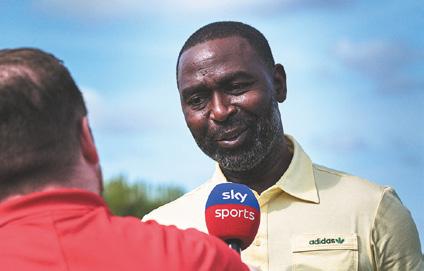
“We launched the Fund when we were in the grip of the Covid pandemic and kidney patients were more vulnerable than ever,” says Lucy Sreeves, executive director of fundraising.
in action Research
Vital progress is being made and as we go to print, new projects focused on ensuring fair and equitable access to kidney transplants and improving lives post-transplant are on the cusp of receiving funding through our latest grants round. We are so grateful for Andy’s determination, and the sustained support received from so many people to get us to this important milestone.”
kidney disease ends here.
Gift inspiration.
Finding great gifts can be daunting. What would go down well in a household impacted by kidney disease? Look no further – our supporters have ideas aplenty, including how your Christmas shopping can help fund vital research.
Warm blanket
“When I was on dialysis, I was always so cold, and had to bring extra layers to stop myself from shivering. If I’d had a cosy blanket, I would have been able to get on with my uni tasks on my laptop and stay warm!” Hattie
Madefrompremiumquality,ultra-soft fleecefabric,this throw is both indulgentand durable. £16, Dunelm

Electric can opener
“My right arm with my dialysis graft in is very weak. Being right handed I struggle to open cans and jars.
I’d find this extremely useful day to day and would save me asking others for help.” Christy
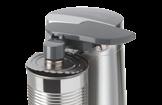
Opensallshapes from small and standard domestic canstolarge1.2kg cans. It also has a lid retainingmagnetfor safedisposaloflid. £28, Kenwood
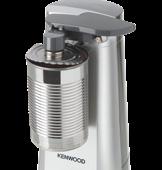
Shop with charity in mind Register with www.easyfundraising.org.uk or www.giveasyoulive.com, follow their instructions and supporting brands will donate to your chosen charity with each purchase you make.
Audiobook subscription
“This would offer a great distraction from the hours we wait in hospitals and clinics for various appointments –you can pick the genre that suits your situation, from a comedy to a self-help! I revisited the Classics when I got too tired to physically read.” Jenna

BookBeatgiftcardsallowyouto enjoyreadingand listeningto1million audiobooks and e-books.
From £6.99, BookBeat
Kidney Research UK has what you need Buy from Kidney Research UK!
Our online shop at www.kidneyresearchuk.org/shop offers a fantastic array of cards, wrapping paper and gifts, including the following:
Medicine Makers jigsaw puzzle
The Book of Nuggets
“Easy to pick up, comforting to read, the Book of Nuggets is full of gentle wisdom and a couple of giggles. A perfect companion for long sessions, quiet evenings, or any moment that needs a lift.” Leanne
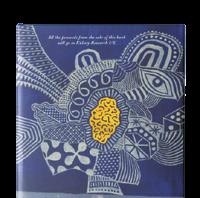

Containing‘nuggets’ofwisdom fromcelebrities,kidneypatients, andmore.Broughttogetherby JulietSolomon,inmemoryofher motherLadyJudithSolomon,with allproceedstoKidneyResearchUK. Retailing at £19, from our online shop
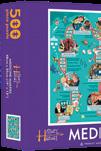
“This is a fun, and educational, jigsaw puzzle with bright colours, interesting shapes and the illustrations have such character. I’ve certainly learnt new facts! A great Christmas gift for any age!” Gill & Bodie the cat
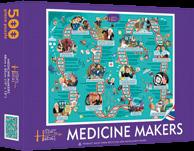
Meet characters and events that haveshapedtheworldofmedicine inthis500piecejigsaw.Suitablefor allagesfrom8+to80+ £16.99, from our online shop
Escape
room game in an envelope
“I can’t wait to spend a night in playing this, with a glass of wine and my wife. As a carer, being able to enjoy these things without physically leaving the house is fabulous.” Steve Anat-homeescaperoomgame toplayaroundyourowntable. Solvethemystery–beforeit’stoo late! Game includes 10 individual puzzles,andaninteractiveonline ending.Aimedat14+,andfor groupsof2-8. £16.99, from our online shop

A huge thank you !
In memory of Ari
Reece and Shona’s world fell apart just before Christmas in 2024, when they lost their two-year-old son, Ari, after an unsuccessful kidney transplant.
Ari bravely fought chronic kidney disease throughout his life, inspiring everyone who knew him with his strength and resilience.
RAISED
£8,500
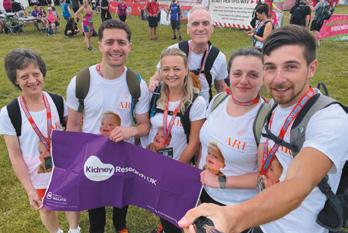
In Ari’s honour, Reece and Shona demonstrated those traits in abundance, raising over £8,500 by completing the Peak District Ultra Challenge alongside their family in June. #Teamlittlelions walked 25km to finish the route and we are incredibly grateful for their support at such a difficult time in their lives.
We will keep Ari in our thoughts as we strive to end kidney disease.
Exceptional young fundraiser
Six-year-old Roman Newell has won an exceptional achievement award from his school, having featured in our Gifts in Wills appeal which led to £237,750 being pledged to support kidney research.
Roman drew pictures which were sent to supporters, including of a tiger,
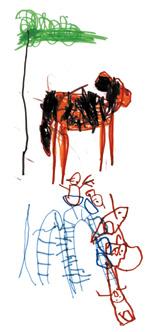
representing his brave battle with kidney disease.
£237,750 PLEDGED
His mum, Carrie, says: “We’ve been told to expect that Roman will need a kidney transplant before he turns ten, but despite his challenges, he is such a positive little boy. We are extremely proud of him and it’s wonderful how he’s being celebrated across his school. I’ll always be his number one fan!”
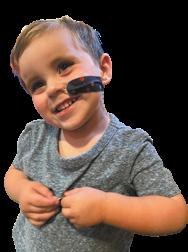
Giving time to help others
Incredible volunteers continue to make a huge difference to their local communities. One shining example is Paul Chear, who volunteers for us as a renal unit contact in Birmingham, supporting dialysis patients and the health professionals who care for them, providing an important bridge between those at the unit and the charity.
Paul says: “My mum spent 20 years of her life receiving dialysis. I remember how difficult that was. I visit renal units as a listening ear, drawing on my own experiences
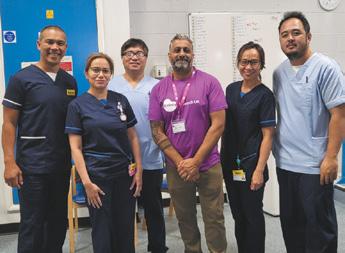
to support patients. I also provide renal staff with information about Kidney Research UK.
“Empathetic conversations and new research can give hope that makes life a little easier. It’s uplifting to see the impact on patients, and I hope Mum would be proud.”
Walking all over kidney disease
Thank you to the 1,500 supporters who joined our annual Bridges Walks in Newcastle, London, Glasgow and Liverpool this summer. You raised more than £200,000 for research into kidney disease!
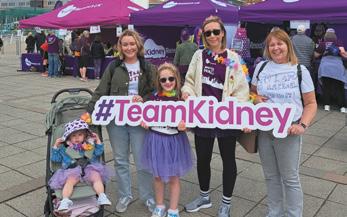
We appreciate everyone who has joined in, including all those who have taken the time to share their personal stories and photos from the walks. Rachael Norris and her daughter, Layla, kindly told us why they decided to walk in Newcastle.
Rachael, who is currently receiving dialysis, says: “Kidney problems have had a huge impact on my life – physically, mentally and financially. The Newcastle Bridges Walk was a fantastic opportunity for us to support kidney research. It was a brilliant day!”
kidney disease ends here.
Son inspires family business
The owners of Thomas Vaughan, a Welsh family business designing bathrooms, kitchens and bedrooms, have raised over £9,000 in support of kidney research, inspired by their son, Dan, who is waiting for a kidney transplant.
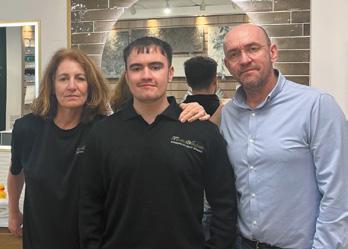
In May, they took on the Welsh Three Peaks Challenge, carrying 180 litres of red coloured water across the three summits to symbolise the amount of blood that healthy kidneys filter each day.
Mum, Carolyn Thomas, says: “Doctors didn’t expect Dan to pull through when he was first rushed to hospital. So many people have supported us and we’re continuing to raise as much money and awareness as possible to support Kidney Research UK.”
Thank you!
Lottery players fund research
Thanks to our 5,500 players, we have raised over £1m through our weekly lottery over the past four years, making an enormous difference to the research we can fund.
Delyth Wanklyn decided to sign-up after receiving a kidney transplant in 2023, and quickly became a winner, celebrating a £20 prize.
She says: “I wanted to play the lottery to give something back and support research. I never expected to win, as I’ve already had the best
gift ever –the gift of life. I will do all I can to help find better treatments, or even cures, for all types of kidney disease.”

You could win up to £10,000 by playing our weekly lottery and helping us fund research – a win-win!
To play, visit: lottery.kidneyresearchuk.org
Diary dates
Make a note of these key dates and visit our website to register your interest in our events at www.kidneyresearchuk.org/events

Peterborough Advent Service
30 November
Christmas Carol Concert
9 December
Join us at St Marylebone Parish Church in London for our Christmas carol concert. Enjoy readings from celebrities and impactful speeches from ambassadors and our chief executive, Sandra Currie OBE, who will reflect on progress being made in kidney research. It’s sure to be an occasion to remember, so don’t miss out!
Virtual March March
1-31 March
Connect with fundraisers across the UK by joining our March March virtual step challenge. Walk 10,000 steps a day wherever you are, and cheer on your teammates by joining our #TeamKidney Facebook group –which is open to all participants.
Peterborough
March March
28 March
London Marathon
26 April
Ultra Challenges
Multiple dates
Push yourself to complete an Ultra Challenge in 2026, taking on routes in beautiful locations across the UK, including the Peak District, Lake District, Isle of Wight, Jurassic Coast and London.
Bridges Walks 2026
Newcastle (June), London (July), Glasgow (August), Liverpool (September)
Be part of our Bridges Walks in 2026! Walk with thousands of likeminded people across the country at our flagship events. Soak in the atmosphere, spot iconic landmarks and connect with the kidney community, all while supporting research into kidney disease.
kidney disease ends here.
